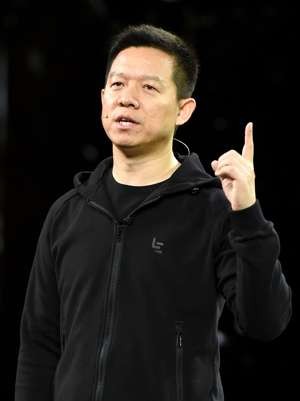
Shareholder pressure means spotlight is shining ever brighter on excessive executive pay
Something is seriously wrong when the people at the top are still getting richer, regardless of how their companies perform

Jia Yueting, the billionaire boss of LeEco, probably best known for its sports TV operation, has promised to reduce his salary to 1Rmb “for life” if he does not sort out the company’s problems.
Whether his newfound investors, led by real estate developer Sunac China Holdings, will help him avoid fulfilling this pledge remains to be seen.
Apple executives, meanwhile, have suffered a reduction in incentive-related bonuses following the recent announcement of the company’s first sales slump since 2001.
The idea that the buck stops somewhere and should be reflected in the remuneration earned by top executives is steadily gaining ground around the world.
Blackrock, the world’s largest asset manager, piled on the pressure by notifying leading companies that if they proposed pay rises for their top executives exceeding the percentage rises given to other employees, it would be using its shareholder power to try and stop them.

And, of course, politicians have piled in to pontificate on executive pay, not least because the public are up in arms over the gap between the pay of ordinary employees compared with that of senior executives. There has long been a big gap here – but now it’s an ocean-sized chasm.
Rumblings on this matter are hardly new but they are growing in volume and reaching places where quiescence was the norm.
One reason for this is that greater corporate transparency has revealed what many suspected but were not sure was going on. Another reason is simply that executives have been getting greedier.
The average compensation for CEOs in America rose 997 per cent in the period between 1978 and 2014 compared to wage rises of just below 11 per cent for most workers
The average compensation for CEOs in America rose 997 per cent in the period between 1978 and 2014 compared to wage rises of just below 11 per cent for most workers, according to an Economic Policy Institute study.
Equally significantly the study found that executive pay was almost double the level of stock market growth – in other words top pay has marched well ahead of company valuations.
The pay gap of more than 300 times between CEOs and average employers is growing, and growing fast.
No wonder this subject of so-called “fat cat pay” is of growing interest – but is it right to get in a tizzy over how much top executives pocket?
The simple answer is “yes” because if the people at the top can get richer regardless of how their companies perform something is seriously wrong. When Apple announced its bonus cut it stressed that incentives to executives needed to be “truly performance based”.
If this is not the case what incentive is there for the corporate leaders to work that bit harder and produce better results?

The reality, however, is that many senior executives do not spend their working hours thinking about their bonuses and modifying their activity accordingly.
However remuneration does exercise a powerful influence on thinking when accompanied by the threat of serious pay cuts for performance failures.
There is now talk of statutory limits or controls on executive pay. This sounds attractive to politicians because it shows that they are “doing something”. However the reality is that executives will end up spending their time finding ways around these controls, time that should be spent improving corporate performance.
Unlike governments, shareholders have an opportunity to step in here, not least because they are partial owners of companies where executives are busy raking in the cash. They can vote with their feet by shunning investments in companies with notoriously bad executive pay records or a lack of transparency over remuneration or they could go down the more laborious path of holding them to account.
Matters are a tad more complicated in Hong Kong because such a high percentage of locally listed companies are majority owned by the families that founded them
As ever, matters are a tad more complicated in Hong Kong because such a high percentage of locally listed companies are majority owned by the families that founded them. It is far more tax efficient for their executives to take their remuneration by way of dividends rather than straightforward pay. Therefore on paper executive remuneration can seem rather modest (well, possibly not to the average Joe) in comparison to executives overseas who take the bulk of their remuneration through various forms of direct payment. As all investors benefit from dividend payouts, shareholders are less prone to complain over high payouts.
So, we hear far less about excessive executive pay in Hong Kong but this does not mean the subject should be ignored. A well-run company does not pay out in dividends more than it earns, something that has been seen locally, and a well run company should be demonstrating to shareholders that it is investing a healthy proportion of its profits wisely – that does not include the purchase of another company limousine for the CEO.
Steven Vines runs companies in the food sector and moonlights as a journalist and broadcaster